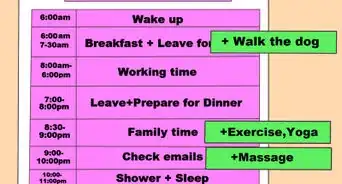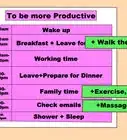This article was co-authored by Annie Lin, MBA. Annie Lin is the founder of New York Life Coaching, a life and career coaching service based in Manhattan. Her holistic approach, combining elements from both Eastern and Western wisdom traditions, has made her a highly sought-after personal coach. Annie’s work has been featured in Elle Magazine, NBC News, New York Magazine, and BBC World News. She holds an MBA degree from Oxford Brookes University. Annie is also the founder of the New York Life Coaching Institute which offers a comprehensive life coach certification program. Learn more: https://newyorklifecoaching.com
There are 7 references cited in this article, which can be found at the bottom of the page.
wikiHow marks an article as reader-approved once it receives enough positive feedback. In this case, 100% of readers who voted found the article helpful, earning it our reader-approved status.
This article has been viewed 168,987 times.
It is very important to have structure and consistency in your life. However, when there’s no routine to follow then things can get pretty chaotic rather quickly. Having a predictable routine is essential to staying organized and helping your family accomplishing necessary tasks.
Steps
Creating a Daily Schedule
-
1Create a spreadsheet with eight columns. The document will represent your schedule for the week. The left column should start with the time that you wake up and end with the time that you go to bed. The other columns should be labeled each day of the week.
- For example, if you wake up at 7am and go to bed at 11pm then the first row in the left column should read 7am. Then continue down the column in one hour increments until you reach 11pm.
- Try creating individual spreadsheets for everyone in the family so that everyone can stay more organized.
-
2Block out fixed hours. Go through the document and indicate times that are already occupied with an activity[1] For example, if your lunch hour is 12pm-1pm then be sure to indicate that on your schedule. Other activities that you should block out include:
- Meetings
- Classes and study time
- Sleeping times
- Church
- Appointments
- Children’s activities
- Spouse’s activities that you plan to attend
- Commute time
- Exercise
Advertisement -
3Schedule in recreation. Recreation is just as important to your quality of life as work and studying. In fact, recreation has been associated with benefits to health related to cancer, heart disease, diabetes, and obesity. It has also been known to reduce stress level. Therefore, be intentional about scheduling in recreation around the other fixed hours. Some great recreational activities include:
- Recreational Sports
- Activities at the YMCA
- Church activities
- Programs at local parks and community centers
- Consider scheduling in some recreational time with the entire family. There are a lot of family programs that will meet the recreational needs of the entire family.
-
4Prioritize events and deal with unexpected changes. You may have your schedule set only to have a last-minute request or obligation pop up, or the timing might change for an event that conflicts with something else on your schedule. This is nothing to panic over — remember, life is unpredictable! You'll need to learn how to prioritize and rank each task to decide what is most important.
- Think about whether or not you can reschedule a task or event for another time, if you feel the task is important or necessary, what you can delegate to another person, etc.
-
5Try your schedule out for one week. Be sure to monitor if you’ve allotted yourself enough time for certain activities. For example, did you give yourself enough time to commute to and from work or do you find that you’re often late or racing to get there on time?
-
6Make necessary revisions. Create a revised schedule based upon the problems that you note in your original schedule.[2] This way your schedule will be more reflective of your actual reality.
- For example, if you find that you are consistently arriving to work 15 minutes late, then your revised schedule should add an additional 20 minutes of commute time.
Creating Your Morning Routine
-
1Determine your bedtime. It’s important to choose a bedtime based upon how much sleep you need. One of the most important things that factor into being organized is waking up on time each morning. Let’s face it, if you wake up late then it impacts the rest of your day. However, when you get adequate sleep then you’re more likely to get up on time each morning. Make sure you choose an appropriate bedtime for the children as well.
- Figure out how much sleep you need to feel well rested in the morning. Then figure out the exact time you need to be in bed in order to achieve this. You may need to experiment by sleeping a different amount of hours for a few nights to see which one works best for you.
- Keep in mind that most healthy adults need 7-9 hours of sleep and children need 10-14 hours of sleep based on age.
- It may be helpful to start winding down approximately 30 minutes before your bedtime. Try turning off electronics so that you can have some quiet time before bed. This is a great way to transition from the day’s activities to bed.
-
2Set your alarm clock. Many people think that your morning routine starts in the morning. However, that’s not entirely true. Setting your alarm the night before will help you wake up on time in the morning.
- To avoid hitting the snooze button in the morning and risk throwing yourself back off schedule, try putting your alarm clock in a place far from your bed. This way you will actually have to get up to turn it off.
- Alternatively, you could set two different alarm clocks that are far from your bed. Space out the timing by about 10 minutes. This way, even if you do lie back down after turning the first one off, the second one will still help you stay on track.
- Make sure the alarm is set to give you enough time to start the process of waking up the children in a timely manner. You may want to start waking slow-risers a few minutes in advance.
-
3Schedule your morning rituals. Many people have specific rituals that they like to engage in before starting the rest of their day. Your rituals could include prayer, exercise, meditation, journaling, or even just spending quiet time with loved ones in the morning. Whatever your rituals are, be sure to actually put them into your schedule. Intentionally scheduling in rituals helps you to avoid running late.[3]
- Schedule in a specific block of time to participate in your rituals. Try half hour, one hour, or two hour blocks.
- Morning rituals often help you clear your mind and can increase productivity. Light exercise can increase blood flow and is a quick way to really increase productivity throughout the day. Something as simple as stretching can be a part of your exercise regimen.[4]
-
4Use a timer while doing hygiene. It’s easy to lose track of time when you’re in the shower, engaging in your beauty regimen, getting dressed, or doing other hygiene activities. However, investing in and using timer can help you stay on track. You can purchase one inexpensively at most stores.
- Showering while the kids are eating breakfast is something that some parents choose to do.[5] However, other parents prefer to eat breakfast with their children.
- Showering the night before is also an option to help stay organized in the morning.
-
5Find ways to use your time wisely. Multitasking is a great way to keep your family organized. For example, you can think of some ways that you can get chores done while also getting ready in the morning. Getting the kids on board to help is also useful. Here are a few suggestions:[6]
- Throw a load of laundry in the wash before leaving for work. You can put them in the dryer when you get home.
- If you have a dog, you can have the children prepare the dog for his walk while you are in the shower. For instance, they can have his leash and “poop bags” ready in advance. When you’re finished showering, you can quickly walk the dog with the children.
- Allow older children to help get the younger children ready in the morning. Getting your ten year old to help find your preschooler’s shoes could really save you some time.
-
6Eat a healthy breakfast. Food is your body’s fuel therefore every morning routine should include a healthy breakfast.[7] If you have a tendency to skip breakfast, try to figure out why you avoid that meal. It may be that you are rushing in the morning or maybe you just don’t like breakfast foods. Whatever the reason, be sure to acknowledge it and then figure out a way to include breakfast into your routine.
- If you don’t like breakfast foods, try eating lunch foods for breakfast instead.
- If you find that you are rushing in the morning, go to bed a little earlier at night so that you can get up a little earlier in the morning.
- If you’re not hungry in the morning, at least have a snack. Remember, food is fuel and it’s important that you properly fuel your body in the mornings.
-
7Leave the house on time. It’s important that you leave the house at the designated time to avoid rushing. Make sure that you factor in all of the stops that you have to make. Whether it’s dropping the children off at daycare or stopping for your morning coffee, be sure that there is plenty of time allotted to get to your destination.
- Figure out how much time you would need to get to your destination, including all stops in between. Try actually timing yourself one morning to get an accurate estimate. Then add 15 minutes to that timeframe to account for traffic or other unforeseen difficulties. Running late will throw you off schedule and you’ll certainly feel less organized.
- Also, try packing needed material the night before. This can save time and help you get out of the door in a more timely fashion in the mornings.
- The car ride to school is a great time to review test material, practice spelling words, or go over math facts, particularly if you had a busy night before.
Preparing at Night
-
1Pick out outfits for the next day. Choosing the outfits for the next day while your children are doing their nightly hygiene is a great time saver.[8] While they are in the bath you can take that time to choose their clothes so that you are not rushing the next day.
- If your children are still very young, do NOT leave them unsupervised in the tub. Also, if your child is older, he can pick out his own clothes for the next day after hygiene is complete.
- Be sure that everything is picked out the night before. This includes shoes, socks, and any accessories such as headbands and jewelry. Also make sure the comb, pick, or hairbrush is in its place to avoid searching for them in the morning.
- Alternatively, you could pick out the clothes, including all accessories, for the entire week on Sunday evenings.
- Make sure coats, hats, and gloves are in the designated space for colder days.
-
2Get all bags ready. Have all bags ready and sitting in their designated space before going to bed.[9] This way, all you have to do is grab them as you are walking out the door. Bags that should be prepared include:
- Book bags
- Work bags
- Lunch bags for the children, you, and your spouse can be filled with non-perishables the night before. The perishable foods and ice packs can be added in the morning.
-
3Organize breakfast in advance. Setting the breakfast table at night can result in a more organized morning. Set out place mats, cups, bowls, spoons and cereals the night before so that everyone can serve themselves as they get up.[10] All that is needed is the milk and juice in the mornings. This works well if you are a cereal eating family.
- You may want to run a load of dishes in the dishwasher right after dinner. This way you will ensure clean dishes to set the table before heading to bed.
-
4Fill out forms. Waiting for the morning to fill out school forms can be disastrous. They can be time consuming, thrusted at you at the last minute, or may be forgotten altogether. Have a specific bin where all school forms go when the kids arrive home in the afternoon.[11] After the kids are in bed, fill out the forms and place them in backpacks so that they are ready to go in the morning.
-
5Create your daily to-do list. It is very helpful to have a to-do list ready the night before. This helps keep everything organized. Be sure to check your calendar and schedule before creating the list so that nothing is forgotten.
- It may be helpful to hang a family calendar.[12] Everyone, with the exception of small children, is responsible for writing down dates of upcoming events. For example, Tierra would be responsible for noting on the calendar the date and time of her upcoming dance recital or basketball game.
Establishing Routines for Children with ADHD
-
1Practice a predictable daily schedule. Identify the times that your child engages in each activity and try to keep it the same each day. When children and parents know what is coming next, it makes the routine that much easier to follow. Specific activities that you may want to incorporate in your schedule include:
- Bedtimes, wake times, and naps
- Bathing
- Leaving for school or daycare
- Extracurricular activities
- Meals
- Other structured activities
-
2Organize your house. Children with ADHD often struggle with remembering where they have placed things. This can be quite challenging when you’re trying to stick to a schedule that is being disrupted because your child can’t remember where he placed his lunch bag. Make sure to organize your home so that he has a logical space to store his items. For example, he may keep his book bag in a bin next to the front door or pencils in his desk drawer. Organize your home so that it makes the most sense for your family and lifestyle.
-
3Create a homework plan. Allow your child to complete his homework in small chunks. In between each chunk, he should be permitted to have a break. It would probably be helpful to use a timer to help your child stay on task. Having a plan can help with the homework routine.
- Have a special place where your child does his homework and keeps his supplies. Keep in mind that every child is different. Some children may need a quiet place away from others to concentrate while other children may need to be near their parents for help with assignments.
-
4Make use of written instructions. Use written reminders to help your child stay focused on the routine. The instructions should be brief so that it doesn’t become a distraction.
- Checklists are great at keeping children with ADHD organized. Try posting a checklist by the exit door, in his room, or anywhere else that will help him to remember the routine.
-
5Offer lots of praise. When you see your child trying to stick to the daily routine, it’s very important to praise him. This will motivate him to continue to practice the routine to the best of his ability. Be sure to not just focus on him completing every detail but recognize his efforts as well.
Expert Q&A
-
QuestionHow do you make yourself stick to a routine?
 Annie Lin, MBAAnnie Lin is the founder of New York Life Coaching, a life and career coaching service based in Manhattan. Her holistic approach, combining elements from both Eastern and Western wisdom traditions, has made her a highly sought-after personal coach. Annie’s work has been featured in Elle Magazine, NBC News, New York Magazine, and BBC World News. She holds an MBA degree from Oxford Brookes University. Annie is also the founder of the New York Life Coaching Institute which offers a comprehensive life coach certification program. Learn more: https://newyorklifecoaching.com
Annie Lin, MBAAnnie Lin is the founder of New York Life Coaching, a life and career coaching service based in Manhattan. Her holistic approach, combining elements from both Eastern and Western wisdom traditions, has made her a highly sought-after personal coach. Annie’s work has been featured in Elle Magazine, NBC News, New York Magazine, and BBC World News. She holds an MBA degree from Oxford Brookes University. Annie is also the founder of the New York Life Coaching Institute which offers a comprehensive life coach certification program. Learn more: https://newyorklifecoaching.com
Life & Career Coach It's hard to start a new habit, especially when you don't have a lot of practice breaking old habits. The easiest way to make a habit stick is to focus on the smallest sub-task possible. For example, if you want to start planning every day after you wake up, just focus on opening your planner every morning. By focusing specifically on the smallest element of the task, it becomes a lot less overwhelming to start doing something. Then, you can build on your habit over time once the easiest part is committed to muscle memory.
It's hard to start a new habit, especially when you don't have a lot of practice breaking old habits. The easiest way to make a habit stick is to focus on the smallest sub-task possible. For example, if you want to start planning every day after you wake up, just focus on opening your planner every morning. By focusing specifically on the smallest element of the task, it becomes a lot less overwhelming to start doing something. Then, you can build on your habit over time once the easiest part is committed to muscle memory.
References
- ↑ http://www.marquette.edu/counseling/documents/TimeManagementandProcrastinationHandout.pdf
- ↑ http://www.marquette.edu/counseling/documents/TimeManagementandProcrastinationHandout.pdf
- ↑ Annie Lin, MBA. Life & Career Coach. Expert Interview. 25 November 2019.
- ↑ http://www.mayoclinic.org/healthy-lifestyle/fitness/multimedia/stretching/sls-20076840?reDate=02092015
- ↑ http://planningwithkids.com/2012/02/22/night-time-routine-getting-ready-for-the-next-day/
- ↑ http://planningwithkids.com/2012/05/10/morning-routine-what-we-do/
- ↑ http://health.usnews.com/health-news/blogs/eat-run/2012/08/02/stop-the-excuses-eat-breakfast?utm_source=huffingtonpost.com&utm_medium=referral&utm_campaign=pubexchange_article
- ↑ http://planningwithkids.com/2012/02/22/night-time-routine-getting-ready-for-the-next-day/
- ↑ http://planningwithkids.com/2012/02/22/night-time-routine-getting-ready-for-the-next-day/
About This Article
If you want to stay organized, start by creating a morning routine to help you stay on time without rushing. Set your alarm clock for the same time each morning and be sure to allow plenty of time to get ready, do chores and enjoy your early morning activities. For example, if you have morning rituals you like to follow, like prayer, exercise or reading, include these when you’re estimating how early you’ll need to get up. And if you tend to lose track of time when showering, dressing or grooming, try setting a timer to help you stay focused and punctual. Always aim to leave your house on time by figuring out how long it’ll take you to get to your destination and you’ll avoid feeling overwhelmed. For more tips from our Counselor co-author, including how to find more time by getting ready the night before, read on!







-Step-15.webp)






















-Step-15.webp)























































